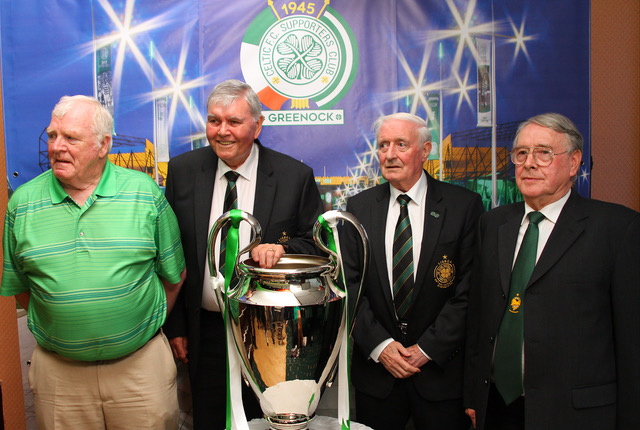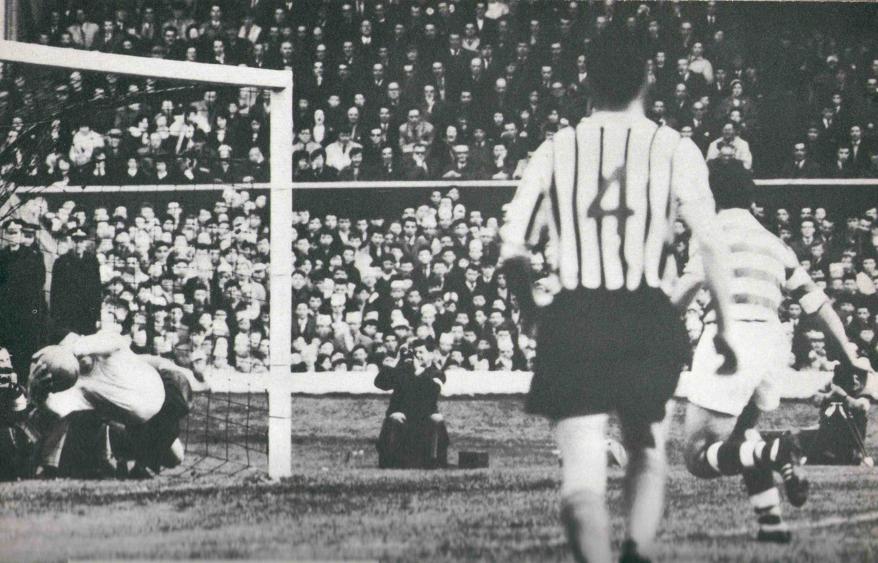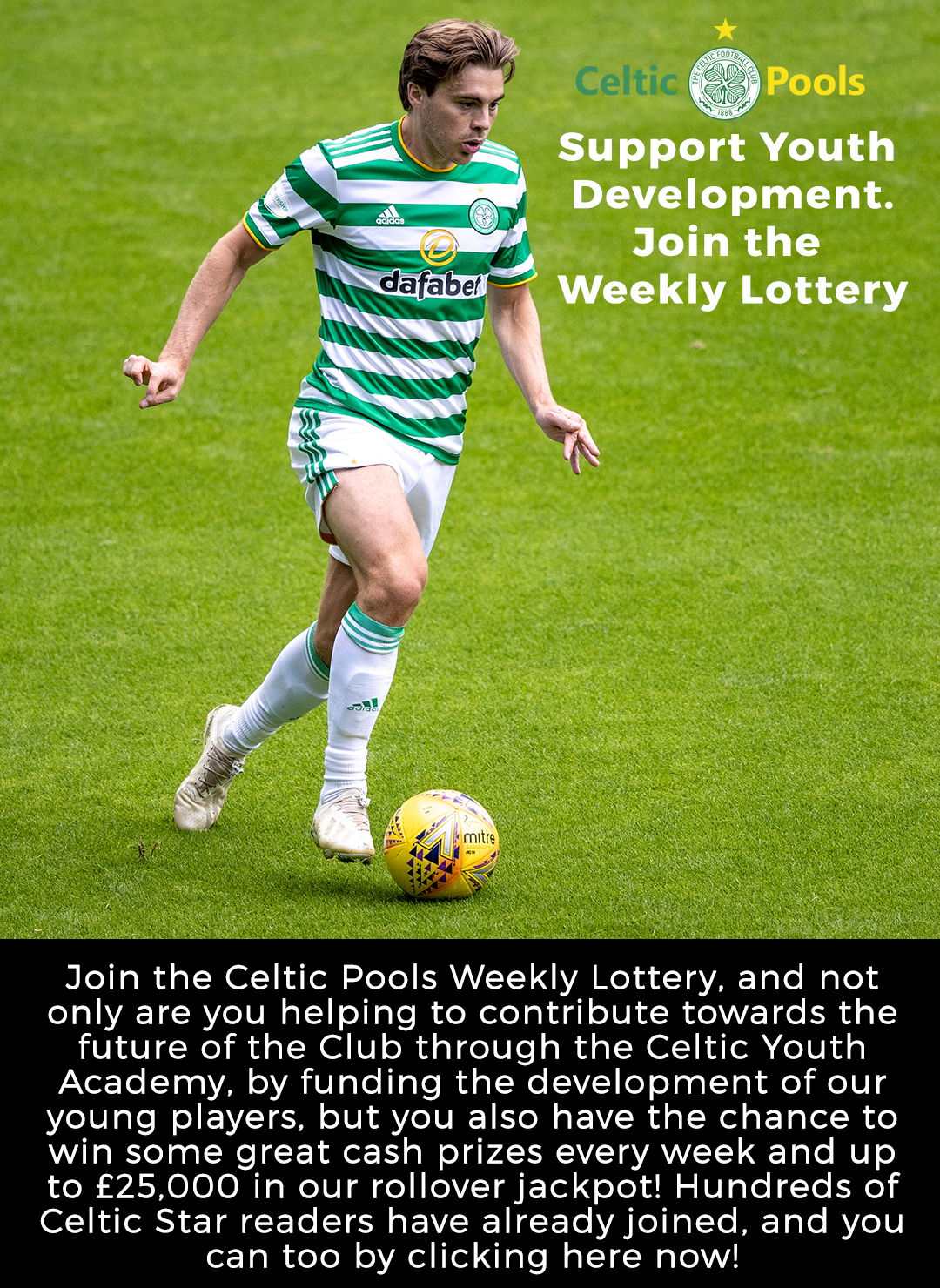His third League goal would come against Clyde at Celtic Park on Monday, 27 February 1961, Charlie’s ‘magnificent shot’ giving Celts a 3-1 lead after they had recovered from the loss of an early goal. The Hoops would go on to win 6-1 that evening against a struggling Shawfield side which included John Colrain at right-half, just three months after his transfer from Celtic. He had lost his Parkhead place due largely to the form of new forward, Stevie Chalmers and would also feature prominently in the story of another Lisbon Lion. Billy McNeill attributes his nickname of Cesar to Colrain, the big Celt naming him after the actor Cesar Romero, who played the getaway driver in the Hollywood blockbuster of the time, Ocean’s Eleven. The story goes that Billy was the first of the group to own a car at that time.
A Lion and a gentleman – many happy returns, Charlie Gallagher 🦁🎂8️⃣0️⃣💚🍀 pic.twitter.com/ap5w41yNTy
— Tony Hamilton 💚🍀 (@polishturnstile) November 3, 2020
But the big story of Celtic’s 1960/61 season was their Scottish Cup run, with Charlie involved all the way. It commenced with a tricky tie at Brockville, on Saturday, 28 January 1961, Bertie Auld’s wickedly deflected shot giving Celts an early lead before captain Bertie Peacock netted a spot-kick double either side of the break, both times after Willie Fernie had been tripped in the box, the Bhoys beating Falkirk 3-1. Next up was a home tie with second-tier Montrose, two weeks later, Gallagher’s first-minute corner finding the net via the unfortunate Angus defender McCorquodale, before doubles from John Hughes and Stevie Chalmers plus an Alec Byrne strike allowed Celtic to coast to a 6-0 victory.
The draw then sent Celtic to Kirkcaldy, on Saturday, 25 February 1961, two future Lisbon Lions on the scoresheet early on as Willie Wallace equalised Stevie Chalmers opener. For the third successive tie, the Hoops benefitted from an own goal, Raith right-half Leigh beating his own keeper within a minute of Wallace’s leveller. The peerless Willie Fernie then scored a tremendous goal before John Hughes headed a fourth for Celts in stoppage time.
The quarter final saw 56,000 pack into Celtic Park for the visit of Hibernian on Saturday, 11 March 1961. Another future Lion was in the opposition goal, Ronnie Simpson having returned north after a successful spell at Newcastle United, where he won two FA Cup-winners medals, incredibly still the last major honours won by the Tyneside club to this day. Simpson would be a star performer on the day, repelling all efforts before finally being beaten by Stevie Chalmers with just five minutes remaining, his late strike keeping Celts in the cup after Kinloch’s second-half opener had looked like being enough for the visitors.
🎂 Happy 80th birthday to former Celt, Charlie Gallagher, who was part of the legendary Lisbon Lions squad. 🦁
Have a great day, Charlie! 🍀 pic.twitter.com/XrorRpccSi
— Celtic Football Club (@CelticFC) November 3, 2020
The show moved through to Edinburgh, four days later, another 40,000 cramming into Easter Road for the replay. Celtic skipper Bertie Peacock failed to recover from a knee injury, paving the way for young John Clark to come in at left-half, the only change from the weekend team. In a game of few chances, the Hoops once again rode their luck, particularly in the closing stages, as England striker Joe Baker, for once, got the better of Billy McNeill, forcing Frank Haffey into a desperate save.
The game turned in extra-time, as Celtic’s superior fitness began to tell, Hibs surviving until the end of the first period…almost. A short corner from Alec Byrne was fed to Clark, the teenager showing remarkable composure to beat his marker before firing home through Simpson’s legs. It would prove the decisive goal of the tie, the Leith men thus failing yet again to end their Scottish Cup bogey over Celtic, which dated back to the final of 1902 – ironically played at Celtic Park, following the first Ibrox Disaster – the last time they had won the trophy. Those two unwanted Hibernian records would remain for a while yet.
Happy 80th Birthday to Celtic legend Charlie Gallagher | The Celtic Star https://t.co/XzxM7t4c41 @Boola_vogue @cfcliamk96
— The Celtic Star Editor – Walfrid & The Bould Bhoys (@CelticStarMag) November 3, 2020
The biggest match of the season so far would then take place on the first day of April 1961, the Scottish Cup semi-final with Airdrieonians at Hampden. The Diamonds were no Fools, having caused a shock in the last-round by beating much-fancied Motherwell 1-0 at Fir Park, whilst St Mirren had repeated that scoreline to eliminate champions Hearts at Tynecastle. The Paisley side, Scottish Cup-winners just two years earlier, would be back at the same Edinburgh venue that afternoon to meet Dunfermline Athletic in the other tie.
A near 73,000 crowd at Hampden would see Celts overwhelm Airdrieonians to secure a spot in the Scottish Cup Final for the first time in five years. The tie was effectively over by half-time, by which stage the Hoops were already four goals to the good, the goals coming in two five-minute bursts. On 20 minutes, John Hughes headed Alec Byrne’s cross past Lawrie Leslie, the big Celt then pouncing on a fumble by the Airdrie keeper to make it 2-0 four minutes later, after a Willie Fernie effort had been blocked. Eight minutes from the break, Stevie Chalmers made it 3-0 with a deft flick, Fernie himself completing the rout before the interval with another wonderful finish. The second half was, perhaps not surprisingly, pretty dull by comparison, other than the powerful Hughes being denied his hat-trick by – yes, you’ve guessed it – referee Tom ‘Tiny’ Wharton, after the Celtic striker had blasted the ball past Leslie.
Lisbon Lions 🦁
Estadio Nacional 🏟️
40th Anniversary visit to Lisbon 🇵🇹
2008 🍀 pic.twitter.com/FY30IfzaVe
— Celtic Curio (@Celticcurio) November 2, 2020
So, the Hoops were in their first major cup final since Hampden in the Sun almost four years earlier, indeed a first Scottish Cup Final appearance for Celtic since the 3-1 defeat by Hearts in April 1956. The 1961 final would see Charlie and the Bhoys up against a familiar face, former Parkhead reserve coach Jock Stein having led his Dunfermline Athletic side to this stage of the competition for the first time ever, following a 1-0 replay win over St Mirren at Tynecastle.
Celtic lined up as follows, before 113,000 spectators at Hampden on Saturday, 22 April 1961, for the first major cup final of Charlie Gallagher’s career, and of my lifetime, baby Matthew Joseph Corr having been born in Glasgow’s Robroyston Hospital exactly a month previously.
Frank Haffey;
Dunky MacKay & Jim Kennedy;
Paddy Crerand, Billy McNeill & John Clark;
Charlie Gallagher, Willie Fernie, John Hughes, Stevie Chalmers & Alec Byrne.
The match would fail to produce any goals and is best remembered for two fantastic saves, one at either end. Early in the first half, a Paddy Crerand rocket was diverted by the head of John Hughes towards the top corner of Eddie Connachan’s goalframe. The cheers of tens of thousands of Celtic supporters were stopped in their tracks as the keeper leapt to clutch the ball at the junction of post and bar, an incredible save. Then in the last minute of play, it was his opposite number Frank Haffey’s turn to shine. The man who had been the subject of ridicule for his part in the 9-3 Wembley debacle seven days earlier single-handedly prevented the cup heading for Fife on that Saturday evening, somehow stopping a goalbound Peebles effort from crossing his line. All to play for then in the replay, scheduled for four days later.
Happy 80th birthday to Charlie Gallagher who played for @CelticFC for over a decade, making a total of 171 appearances and scoring 32 goals. This included 106 Scottish League appearances and 17 league goals. He also played in 13 European games. HH pic.twitter.com/vlZ8iJL9rd
— Celtic Gossip (@CelticGossip) November 3, 2020
There was a Celtic emergency on the day of the replay, Wednesday, 26 April 1961, as Hoops defender Jim Kennedy was rushed to hospital suffering from appendicitis. Bizarrely, Dunfermline had lost winger Tommy McDonald through the same illness on the Saturday. Kennedy’s place would go to 20-year-old full-back Willie O’Neill, the proverbial baptism of fire for the youngster, the Hoops team otherwise unchanged. Just as in the first game, the replay would be a tale of two goalkeepers, although sadly for the popular Haffey, the misery following the fallout from Wembley would now continue at Scotland’s national stadium.
Connachan was again in inspired form, defying the eager Hoops forwards time after time in the first half, as both sides again failed to break the cup final deadlock by the interval. The game turned within a minute midway through the second period. For once, Stevie Chalmers’ shot had beaten the Dunfermline keeper, only to be handled by a defender, Celtic appeals for a penalty kick waved aside by referee Hugh Phillips. As often happens, the Pars then went straight up the field to take the lead, centre-forward Davie Thomson, a replacement for youngster Dan McAlindon from the Saturday game, on one knee as he dived to head low past Haffey for 1-0.
With six minutes remaining, Connachan broke Celtic hearts yet again, this time the inspired keeper somehow keeping out a 20-yard thunderbolt from Paddy Crerand. As the Hoops piled forward in a desperate attempt to level the tie, there was another kick from the football Gods for poor Frank Haffey. There seemed little danger in the 88th minute, as a long ball from midfield dropped into his box, the Celtic keeper favourite to reach it ahead of Charlie Dickson. However, this time the under-pressure Celt misjudged the bounce of the ball badly, left in the Hampden mud as the Pars forward carved his own name into Dunfermline folklore.
The sight of Jock Stein running delightedly from the Hampden dugout to embrace his players would be an all-too-familiar one as the sixties progressed. Sadly, the broken-hearted men in Hoops would not be the recipients of a hug from the big man in the white overcoat on that damp Glasgow evening. Charlie and the other Bhoys would look on dejectedly as the Fifers collected their winners’ medals, one of the saddest tasks for a professional player to endure.
Their time would come, though.
Hail Hail,
Matt Corr
Thanks, as always, to the folk behind the Celtic Wiki, a wonderful source of information, and to David Potter, author of Charlie’s biography, Charlie Gallagher? What a Player!
Follow Matt on Twitter @Boola_vogue





